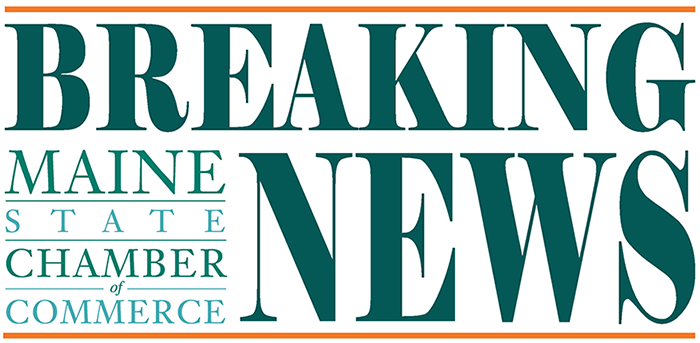|
|
|
Breaking News | June 24, 2020 |
We are sharing this breaking news Our COVID-19 Impact newsletter will return tomorrow. |
|
Mills
Administration Releases COVID-19 Prevention Checklists for Stage 3 Business
Reopenings |
|
The Mills Administration today
posted additional COVID-19 Prevention
Checklists for businesses and activities to voluntarily resume on July 1
as part of Stage 3 of the Administration's Restarting
Maine's Economy Plan . The checklists, written in close collaboration
with industry leaders and public health experts, outline health and safety
protocols for businesses and activities to comply with in
order to resume safely. The checklists posted today include:
Additionally, in response to feedback
from businesses and public health experts, the Department of Economic and
Community Development has updated guidance for some businesses already open
under the Restarting
Maine's Economy Plan. "These reopenings represent a positive step forward for Maine and our economy, but Maine people and businesses must remain vigilant," said Governor Mills. "The increasing, and in some instances record high, number of COVID-19 cases in other states are cautionary tales for Maine as we continue our reopening, monitor the prevalence of the virus here, and look towards our economic recovery. Nothing would be more devastating to our economy than a significant surge in the virus that sickens and kills more people and jeopardizes our health care capacity. By taking good care of ourselves and others, we can continue to reopen safely." "With the release of these Stage 3 COVID-19 Prevention Checklists, we continue to make progress in safely re-opening Maine's economy," says Heather Johnson, Commissioner of the Department of Economic and Community Development. "The Administration will continue to work hard to reopen businesses while remaining vigilant in the fight against this virus and planning our long-term economic recovery." "The expansion of business reopening is paralleled by the expansion of public health practices to protect Maine residents and visitors," said Jeanne Lambrew, Commissioner of the Department of Health and Human Services. "This includes the quadrupling of Maine's testing capacity in July and increasing access to tests for people throughout the state." The vast majority of Maine's economy has been reopened under
the Mills Administration's Restarting Maine's Economy plan. With the
initiation of Stage 3, that will only continue to grow, and Maine remains
either on a par or ahead of other northeastern states in terms of its
reopening. Adjusted for population size, as of June
22, Maine ranked eighth lowest in the nation in terms of positive cases; 11th
lowest in the nation in terms of deaths; 6th lowest in terms of patients
ever-hospitalized out of the 36 states reporting; and 5th highest in the
percentage of people who have recovered out of the 43 states reporting. |
|
|
|
Mills Administration
Dedicates Coronavirus Relief Funding for State and Local Match on FEMA Public
Assistance |
|
$35 million will support the 25 percent required match
for COVID-related expenses incurred by eligible organizations in Maine. |
|
The Mills
Administration announced today that it is dedicating $35 million of Maine's
$1.25 billion in Coronavirus Relief Funding (CRF) provided through the CARES
Act to help
local and tribal governments and other qualified entities cover costs
incurred as a result of COVID-19. Under the Disaster
Declaration requested by Governor Mills and approved by the President, the
Federal Emergency Management Agency (FEMA) traditionally provides 75 percent
reimbursement of disaster costs with a 15 percent state match and a 10
percent local match. With today's announcement, the Administration will use
Federal funds allocated to cover the local match, providing financial relief
to municipalities and others that are confronting stretched budgets. "Municipalities across Maine are on the frontline of battling COVID-19," said Governor Janet Mills. "With this action, I hope State government can somewhat ease the financial burden that budget-crunched municipalities face as we continue to confront this pandemic together. I also hope the Federal government will provide greater financial support and more flexibility in the use of Federal funds so that the State may be able to be more helpful in the future." "Our Administration
continues to look for ways to support local and tribal governments and other
qualified entities during this challenging time, and we believe this is a
helpful step," said Kirsten Figueroa, Commissioner of the Department of
Administrative and Financial Services. Coronavirus Relief
Funds were provided to states through the Coronavirus Aid, Relief and
Economic Security Act (FAQs
posted on U.S. Treasury's website). On May 20, 2020,
the U.S. Treasury Department issued new guidance that the CRF can be used for
this 25 percent local match and written assurance of that guidance is
expected in the near future. Given that CRF cannot
be used to backfill for government revenue losses, many local government
expenses directly related to COVID-19 are likely eligible for FEMA
reimbursement. Applicants who may
be eligible are encouraged to apply for assistance by contacting the Maine
Emergency Management Agency (MEMA) at [email protected].
More information about the match assistance provided with CRF can be found on
the State of Maine Bureau of the Budget website. For information on
the FEMA Public Assistance process and eligible applicants and expenses,
please visit the MEMA
website. For information regarding the use of CARES Act funding in Maine
to date, please visit the Maine
Bureau of Budget website, which is updated weekly. |
|
TO
UNSUBSCRIBE, CLICK HERE. |
NOTICE: In an ongoing effort to thwart
the activities of online hackers, the Maine State Chamber |

